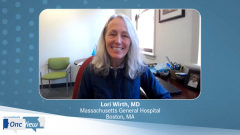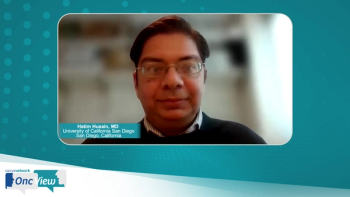
Facing Unmet Needs and Ongoing Trials in RR-DTC
Lori Wirth, MD, discusses the unmet needs and ongoing trials in development for patients with RR-DTC.
Episodes in this series

Matthew Fowler: Dr Wirth, looking ahead a little bit, what are some of the remaining unmet needs in the treatment of RAI [radioactive iodine]-refractory DTC [differentiated thyroid cancer]?
Lori Wirth, MD: Well, of course, there are a number of unmet needs. We don’t cure most patients, unfortunately, with our treatment approaches and that’s what we all want. So we’ve got treatments that are really highly advantageous, but we’re greedy and that’s just never enough. And of course, majority of patients do go on to develop disease progression. So we’d love to capitalize that really good, very high and durable response rate that we see with lenvatinib [Lenvima]. We’ve explored the combination of pembrolizumab [Keytruda] and lenvatinib, but that’s only in a small phase 2 trial, so I’m not quite sure what’s going to happen there in the future. The other area where there’s a lot of interest in and we’ve seen a lot of small phase 2 studies is the idea of re-differentiation, which basically means using systemic therapy to modify the thyroid cancer cells so that they’ll respond once again to radioactive iodine. And we know that some of the molecular alterations, like BRAF V600E, the RET fusions, the NTRK fusions, do lead to the loss of thyroid cancer cells’ ability to take up radioactive iodine. So there are some efforts underway to study re-differentiation, including a study that’s underway looking at targeting the RET-fusion pathway, along with radioactive iodine in patients with iodine-refractory RET fusion-positive DTC. I think the other unmet need is that we don’t really understand what the mechanisms of resistance to the VEGF inhibitors are. We have a much better handle on emerging acquired resistance mechanisms with the gene-specific therapy. And so, we’re making progress with second-line RET and NTRK inhibitors as a result of that, but there’s a big black box for why patients who respond so beautifully to say lenvatinib or cabozantinib [Cabometyx] go on to develop acquired resistance. That we still don’t understand.
Matthew Fowler: And you mentioned 1 or 2 of these already, so there’s not much if you don’t have much to add, that’s all right. But are there any trials in development or ongoing that you’re particularly excited about that are going to read out results in the near future?
Lori Wirth, MD: There are a couple of trials that I am very excited about. The clinical trials investigating dabrafenib [Tafinlar] and trametinib [Mekinist] and BRAF mutants’ iodine-refractory PTC in the second-line setting, I think, is a very important trial. The next-generation RET/NTRK inhibitor trials are very important and there are a number of different agents that are being studied in that setting as well that I think are important trials. And then another important effort that’s underway is getting back to the very beginning of our discussion with thyroid cancer and making sure that we’re not overtreating patients with thyroid cancer. So there are a number of efforts looking at how patients do with active surveillance for very early stage thyroid cancers without even undergoing surgery. So those are important studies that I want to not forget to mention as well.
Matthew Fowler: Right. And so to conclude our conversation, Dr Wirth, what advice do you have for community oncologists treating patients with RAI-refractory DTC?
Lori Wirth, MD: Well, listen, I admire community oncologists who really know so much more about oncology than I do, but I have deep knowledge on a very rare cancer type, and I think it’s challenging for me to take care of patients with breast cancer and lung cancer. But I think it’s very challenging for community oncologists to take care of patients with these very rare cancers and, of course, NCCN [National Comprehensive Cancer Network] guidelines are tremendously helpful and they’re very accessible and they get updated on a regular basis. But I also really like the old-fashioned phone-a-friend approach. So those of us that take care of patients with these rare diseases are always really happy to have our colleagues reach out to us and we’re always happy to provide some advice and guidance because there’s a lot that cannot be put into the NCCN guidelines. For example, what’s the best molecular diagnostic test that I should do on this patient with metastatic iodine-refractory follicular thyroid cancer? The NCCN guidelines can’t quite get that granular, so just reaching out to your friends and colleagues can really help a lot, I think.
Matthew Fowler: Absolutely. Well, this has been great. Thank you for your time and insight, Dr Wirth.
Lori Wirth, MD: Thank you, Matthew. I really appreciate the opportunity to talk with the group.
Matthew Fowler: And thank you to our audience for watching this Contemporary Cancer Network® OncView program from MJH Life Sciences®. We hope you found this to be valuable to your clinical practice.
Transcript edited for clarity.
Newsletter
Stay up to date on recent advances in the multidisciplinary approach to cancer.







































